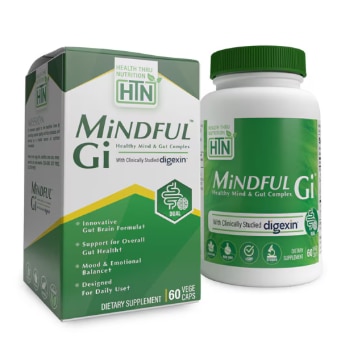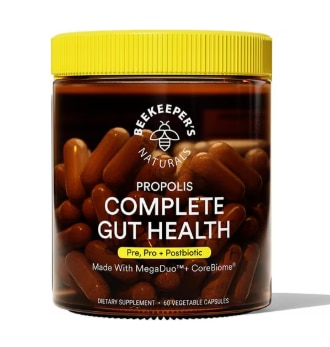You’ve just wrapped up a classic summer day in the sun — or a hectic morning running errands in a hot car. By the time you get home, you’re so nauseous and bloated that all you want to do is lie on the couch with the AC on full blast.
It’s not your imagination: Summer heat can affect gut health. But with the right precautions, you can keep your gut happy whether you’re enjoying a beach vacation or making your regular run to the grocery store.
Heat stress, gut health and the microbiome
Problems with gut health in summer start with heat stress. Heat stress happens when you spend so much time out in hot weather that your body struggles to cool itself down and your temperature rises above the normal average of 37°C (98.6°F). Along with increasing your likelihood of developing heat exhaustion or heat stroke, increased body temperature may affect the structure and environment of your gut.
High summer temperatures may cause leaky gut
Both animal and human studies show that high temperatures can damage the epithelial cells that make up the protective lining inside your gut. Proteins called junction proteins usually keep the spaces between epithelial cells tight so microbes and food particles can’t escape into your bloodstream. Heat stress may affect the production of these proteins by either directly damaging the cells or decreasing blood flow to the intestines.
When junction proteins decrease, the spaces between epithelial cells start to open up, making the gut more permeable. This condition, commonly known as “leaky gut,” allows bacteria and substances in their cells walls called endotoxins to “leak” out and travel to other areas of the body. One particular endotoxin, lipopolysaccharide (LPS), can interact with receptors on the surface of immune cells and trigger the release of pro-inflammatory proteins, which may cause additional gut damage.
Heat stress can trigger dysbiosis in the microbiome
Heat may also change the balance of bacteria in your gut microbiome. Gut microbes use an internal mechanism called a heat shock response to stabilize and protect themselves in changing temperatures, but some microbes are better at this than others.
Commensal (or “good”) bacteria like Bifidobacterium and Firmicutes appear to have a weaker heat shock response and therefore can decrease when temperatures rise. But pathogens like E. coli, Salmonella, Campylobacter and Clostridioides difficile tend to be more heat tolerant. Some may actually thrive and become more virulent in the heat.
The resulting imbalance between commensals and pathogens, known as dysbiosis, could be behind some of the digestive symptoms you experience in summer heat, including diarrhea, stomach cramps, nausea, vomiting and fever.
The gut effects of exercise and heat stress
You may be more likely to develop gut problems from heat stress if you exercise outdoors in the summer. Exercising naturally increases your body temperature and prompts your body to use natural internal mechanisms like sweating to cool you down. But it’s much harder for these mechanisms to keep your temperature stable during hot weather — a strain that can also affect your gut.
In a 2023 study, researchers found that higher body temperatures caused by prolonged strenuous exercise may increase intestinal permeability and the transfer of endotoxins from the gut to the blood stream. Exercising in temperatures of 35°C (95°F) or above appeared to cause a greater increase in permeability than exercising in more moderate conditions. Higher body temperatures also appeared to be connected to an increase of pro-inflammatory proteins in the blood.
The extent of these effects may depend on how long and hard you exercise, how much water you drink and the overall outdoor temperature. Fitness level plays a role, too: The fitter you are, the better able your body may be to counteract inflammation from heat stress. But for most people, exercising outdoors when it’s too hot is likely to increase the severity of summer gut symptoms.
Summer heat can ruin your appetite
Even if you don’t suffer from gut discomfort in the heat, you may simply not feel like eating. A 2023 study on mice shed light on one possible reason why: Hot, humid weather may affect the hormones that control hunger and fullness.
Researchers found that mice kept in high-temperature, high-humidity conditions had more of the appetite-suppressing hormone peptide YY (PYY) and less appetite-stimulating ghrelin. As a result, the mice ate less and grew more slowly than mice in a control group kept under normal temperature conditions.
The change in appetite appeared to be connected to a shift in gut bacteria. Other experiments suggest that the gut microbiome could affect how mice produce insulin and process food, which may cause them to adjust how much they eat in response to extreme temperatures.
Protecting your gut from summer heat
The risk of gut damage from heat stress doesn’t have to keep you stuck inside during the warmest months. Taking steps to stay cool can help keep your gut healthy, reduce symptoms and let you get back to enjoying your summer.
When you spend time outside:
- Schedule your activities to avoid the hottest parts of the day
- Save longer periods of activity for cooler, drier days
- Make sure you have access to a cool or air-conditioned indoor area
- Use sun shades or heat shields to keep parked cars cooler
- Create a breeze with hand fan to evaporate sweat and carry away heat
- Ice down pulse points on your neck and wrists with cold packs or a chilled water bottle
- Drink water throughout the day to stay hydrated
- Avoid dehydrating beverages like caffeinated tea, coffee and energy drinks
- Snack on water-rich foods like watermelon, strawberries, cucumbers, radishes and celery
When you plan meals:
- Choose no-cook recipes, especially if you live in a home or apartment without air conditioning
- Make dishes that can be served chilled like quinoa salad, pasta primavera or shrimp scampi with zucchini noodles
- Consider eating a hot or spicy meal to stimulate sweat and cool you down—but only if the humidity is low and you’re not already sweating
- Avoid high-fat, high-calorie foods, including pizza, takeout and ice cream; these may increase your body temperature, trigger inflammation and put you at greater risk for heat stress
When you exercise outdoors:
- Drink water or an electrolyte drink before, during and after your workout
- Exercise early in the morning or later in the evening when temperatures are cooler
- Wear loose-fitting clothing made from breathable or moisture-wicking fabrics like nylon, cotton or rayon
- Reduce the intensity or length of your workout
- Pay attention to your body’s signals, and stop exercising if you get cramps or feel dizzy, weak or nauseous




